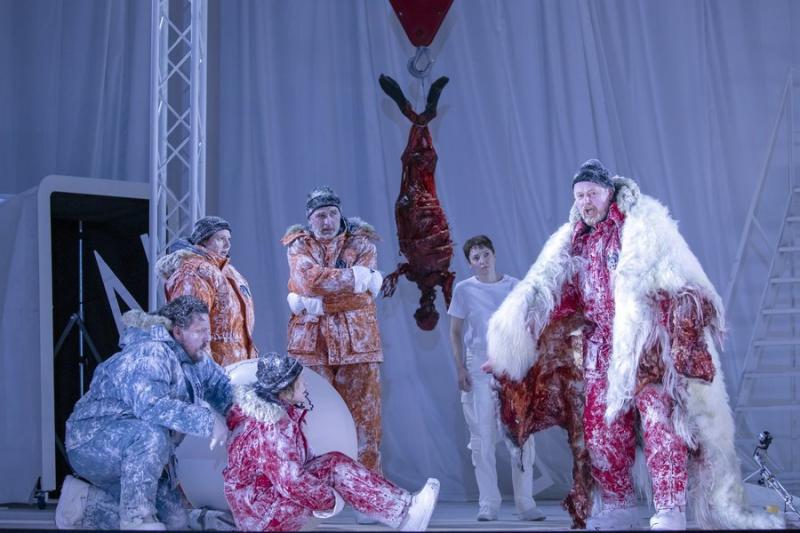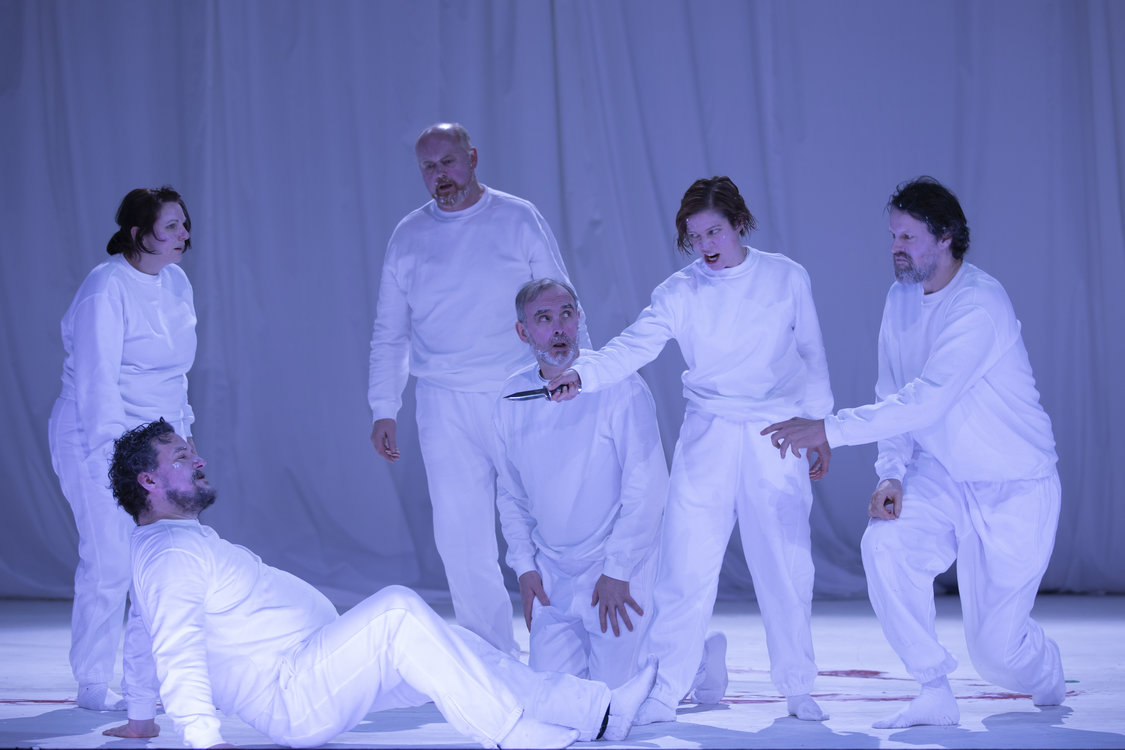Anthropocene, Hackney Empire review - vivid soundscapes but not quite enough thrills | reviews, news & interviews
Anthropocene, Hackney Empire review - vivid soundscapes but not quite enough thrills
Anthropocene, Hackney Empire review - vivid soundscapes but not quite enough thrills
McRae's operatic eco-thriller gives the audience plenty to chew on

The flayed corpse of a dead seal hangs red and grotesque at the back of the stage. It’s a placeholder; we know that by the end of Anthropocene – Scottish composer Stuart McRae’s latest collaboration with librettist Louise Welsh – something more familiar, and far more horrifying, will take its place.
It’s the same trick we hear in McRae’s skilfully crafted score, which opens in teeming musical activity. The orchestra scuttles and ticks with nervous animation. But while the sense is of motion, the harmony remains resolutely rooted, unmoving – a musical block of ice trapping life, confrontation and action within it. It’s only a matter of time before all that pent-up energy finds violent release, musical and otherwise
There’s vocal talent to burn here
McRae and Welsh’s fourth collaboration (following on from 2016’s excellent The Devil Inside) plays out on a scientific expedition to the Arctic. When their ship becomes trapped in the ice and an alarming discovery is made beneath it, the various members are forced to measure the price of survival.
An operatic thriller should be a contradiction in terms. How can a form whose currency is agility, swiftness, the unexpected, survive in a genre rooted in slow-forming song? And yet from Tosca to The Turn of the Screw we’ve seen it work – the friction between tension and controlled release only raising the stakes, the thrills all the keener for being hard-won. In a reliably challenging climate for new opera in which survival means poaching or at least sharing film and television audiences, it’s interesting to see the growing popularity of the form: Nico Muhly’s Two Boys and Marnie, Donnacha Dennehy’s The Second Violinist, Paul Moravec’s hit The Shining just some of the many recent examples.
 McRae plays a long game. Careful pacing gives us an opening Act of vivid atmospherics – the orchestra flickering with its own Northern Lights, jagged-bright in high woodwind, edges blurred in smudgy quarter-tones, the ice roaring in muffled brass bellows. But as the action moves inwards and the focus turns psychological there’s a slackening. The quick scene cutaways (curtain descending; orchestral interlude) work brilliantly to keep things moving forwards, but a denouement that want to embrace not just suspense-thriller but also moral and ecological drama feels over-weighted – an uneasy marriage of Heart of Darkness and recent Sky drama Fortitude.
McRae plays a long game. Careful pacing gives us an opening Act of vivid atmospherics – the orchestra flickering with its own Northern Lights, jagged-bright in high woodwind, edges blurred in smudgy quarter-tones, the ice roaring in muffled brass bellows. But as the action moves inwards and the focus turns psychological there’s a slackening. The quick scene cutaways (curtain descending; orchestral interlude) work brilliantly to keep things moving forwards, but a denouement that want to embrace not just suspense-thriller but also moral and ecological drama feels over-weighted – an uneasy marriage of Heart of Darkness and recent Sky drama Fortitude.
 Matthew Richardson’s production feels similarly caught between stools, its yearning towards a kind of expressionist abstraction at odds with the emphatic literals of Samal Blak’s design. But the cast, incisively conducted by Stuart Stratford, are exemplary. There’s talent to burn here, whether it’s Jennifer France’s Ice (pictured above with LeBrocq, Gadd and Bern) – urgent and alien, making McRae’s demanding, high-lying writing sound almost too easy – or Anthony Gregory’s engineer Vasco, crooned as gently as Mark Le Brocq’s deliciously brash and ebullient Harry King is trumpeted, or Paul Whelan’s ominous Captain Ross, the earthy bass anchor to France’s shooting-star soprano.
Matthew Richardson’s production feels similarly caught between stools, its yearning towards a kind of expressionist abstraction at odds with the emphatic literals of Samal Blak’s design. But the cast, incisively conducted by Stuart Stratford, are exemplary. There’s talent to burn here, whether it’s Jennifer France’s Ice (pictured above with LeBrocq, Gadd and Bern) – urgent and alien, making McRae’s demanding, high-lying writing sound almost too easy – or Anthony Gregory’s engineer Vasco, crooned as gently as Mark Le Brocq’s deliciously brash and ebullient Harry King is trumpeted, or Paul Whelan’s ominous Captain Ross, the earthy bass anchor to France’s shooting-star soprano.
The musical language in uncompromising, but plenty of set pieces – an unexpectedly lovely, almost Monteverdian duet for France and Jeni Bern’s Professor, a poignant aria for Stephen Gadd’s scientist and an ravishing trio for the three women – give the ear supportive scaffolding. Anthropocene is a piece that grows out of a tradition. Its form but also its content invite comparisons with Maxwell Davies’s The Lighthouse, Tarik O’Regan’s Heart of Darkness and of course Britten’s two great watery operas Peter Grimes and Billy Budd. It’s not yet perhaps quite the taut finished product of The Devil Inside, but its greater ambition and scope leaves you hungry to hear whatever McRae and Welsh choose to tackle next.
The future of Arts Journalism
You can stop theartsdesk.com closing!
We urgently need financing to survive. Our fundraising drive has thus far raised £49,000 but we need to reach £100,000 or we will be forced to close. Please contribute here: https://gofund.me/c3f6033d
And if you can forward this information to anyone who might assist, we’d be grateful.

Subscribe to theartsdesk.com
Thank you for continuing to read our work on theartsdesk.com. For unlimited access to every article in its entirety, including our archive of more than 15,000 pieces, we're asking for £5 per month or £40 per year. We feel it's a very good deal, and hope you do too.
To take a subscription now simply click here.
And if you're looking for that extra gift for a friend or family member, why not treat them to a theartsdesk.com gift subscription?
more Opera
 Orpheus and Eurydice, Opera Queensland/SCO, Edinburgh International Festival 2025 review - dazzling, but distracting
Eye-popping acrobatics don’t always assist in Gluck’s quest for operatic truth
Orpheus and Eurydice, Opera Queensland/SCO, Edinburgh International Festival 2025 review - dazzling, but distracting
Eye-popping acrobatics don’t always assist in Gluck’s quest for operatic truth
 MARS, Irish National Opera review - silly space oddity with fun stretches
Cast, orchestra and production give Jennifer Walshe’s bold collage their all
MARS, Irish National Opera review - silly space oddity with fun stretches
Cast, orchestra and production give Jennifer Walshe’s bold collage their all
 Káťa Kabanová, Glyndebourne review - emotional concentration in a salle modulable
Janáček superbly done through or in spite of the symbolism
Káťa Kabanová, Glyndebourne review - emotional concentration in a salle modulable
Janáček superbly done through or in spite of the symbolism
 Buxton International Festival 2025 review - a lavish offering of smaller-scale work
Allison Cook stands out in a fascinating integrated double bill of Bernstein and Poulenc
Buxton International Festival 2025 review - a lavish offering of smaller-scale work
Allison Cook stands out in a fascinating integrated double bill of Bernstein and Poulenc
 Tosca, Clonter Opera review - beauty and integrity in miniature
Happy surprises and a convincing interpretation of Puccini for today
Tosca, Clonter Opera review - beauty and integrity in miniature
Happy surprises and a convincing interpretation of Puccini for today
 Hamlet, Buxton International Festival review - how to re-imagine re-imagined Shakespeare
Music comes first in very 19th century, very Romantic, very French operatic creation
Hamlet, Buxton International Festival review - how to re-imagine re-imagined Shakespeare
Music comes first in very 19th century, very Romantic, very French operatic creation
 Falstaff, Glyndebourne review - knockabout and nostalgia in postwar Windsor
A fat knight to remember, and snappy stagecraft, overcome some tedious waits
Falstaff, Glyndebourne review - knockabout and nostalgia in postwar Windsor
A fat knight to remember, and snappy stagecraft, overcome some tedious waits
 Salome, LSO, Pappano, Barbican review - a partnership in a million
Asmik Grigorian is vocal perfection in league with a great conductor and orchestra
Salome, LSO, Pappano, Barbican review - a partnership in a million
Asmik Grigorian is vocal perfection in league with a great conductor and orchestra
 Semele, Royal Opera review - unholy smoke
Style comes and goes in a justifiably dark treatment of Handelian myth
Semele, Royal Opera review - unholy smoke
Style comes and goes in a justifiably dark treatment of Handelian myth
 Le nozze di Figaro, Glyndebourne review - perceptive humanity in period setting
Mostly glorious cast, sharp ideas, fussy conducting
Le nozze di Figaro, Glyndebourne review - perceptive humanity in period setting
Mostly glorious cast, sharp ideas, fussy conducting
 Fidelio, Garsington Opera review - a battle of sunshine and shadows
Intimacy yields to spectacle as Beethoven's light of freedom triumphs
Fidelio, Garsington Opera review - a battle of sunshine and shadows
Intimacy yields to spectacle as Beethoven's light of freedom triumphs
 Dangerous Matter, RNCM, Manchester review - opera meets science in an 18th century tale
Big doses of history and didaction are injected into 50 minutes of music theatre
Dangerous Matter, RNCM, Manchester review - opera meets science in an 18th century tale
Big doses of history and didaction are injected into 50 minutes of music theatre

Add comment